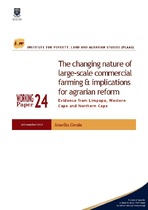The changing nature of large-scale commercial farming & implications for agrarian reform: evidence from Limpopo, Western Cape and Northern Cape
Abstract
The privileged position of white commercial farmers in South Africa came to an end by the early 1990s,
when political and policy changes removed the certainty provided by controlled marketing, protective
tariffs and weak legislation regulating resource use and labour relations on farms and transformed
agriculture into a sector that is highly sensitive to events on world markets. Despite their dwindling
numbers and disarticulation from political power commercial farmers represent a dominant group in the
countryside, retaining a near monopoly of resources and considerable power. Yet, the dynamics of change
in the sector are not properly understood or well-researched. This paper presents data from a recent
survey of 141 commercial farmers in the Limpopo, Western and Northern Cape Provinces that shows that
they consider input costs, climate, labour matters, uncertainty about government policies and producer
prices as the major pressures bearing down upon them. The adoption of farming methods which are less
labour-intensive and the extension of labour legislation and minimum wages to farm workers, together
have led to the decline of on-farm employment. Declining profit margins have resulted in a ‘shake-out’ in
which only the most competitive enterprises can survive, leading to increased concentration in agricultural
landholding and production. These processes imply that new entrants to agriculture with limited capital
face daunting challenges, which policy needs to address. The paper explores these wider implications.

